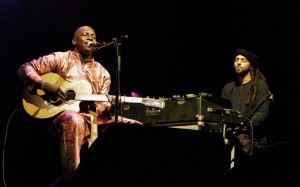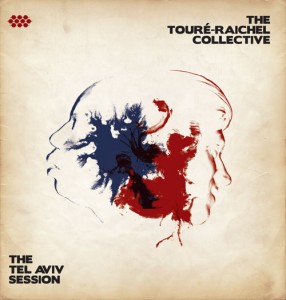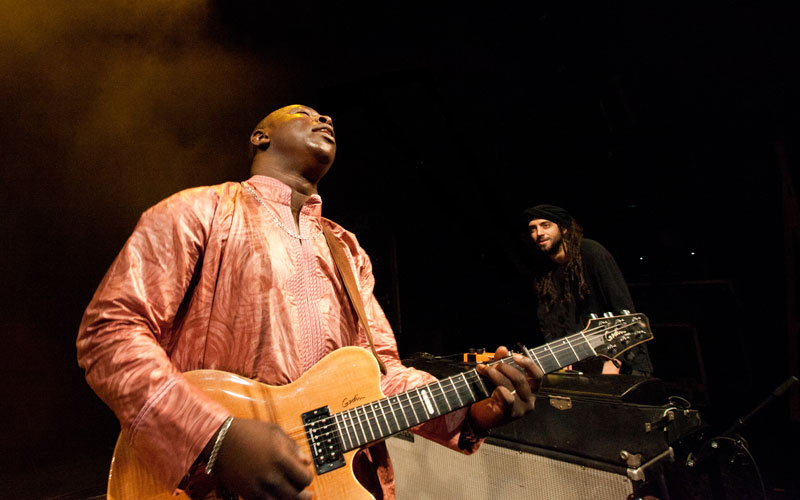Music Review: The Touré-Raichel Collective — Nothing If Not Surprising
Between songs Touré and Raichel conferred inaudibly with one another, deciding which tune they would play next. There was very little chatting up the audience until before the fourth song. Raichel said, “Hello, Boston.” Touré asked, “How you doing?” and the audience roared.
The Touré-Raichel Collective. Presented by World Music/CRASHArts at the Somerville Theater, Somerville, MA, March 15.
By Jim Ball
When two big stars of the music world get together, it’s of medium interest. When two big stars of the world music pantheon combine, the partnership leaves interesting well behind, especially when they come from different ethnic genres. The Touré-Raichel Collective brings Israeli mega-star Idan Raichel together with Malian giant Vieux Farka Touré. Raichel’s band, the Idan Raichel Project,has been bringing its eclectic Middle Eastern, Afro, pop-cum-rock blend to world stages for a decade now to great acclaim. Jerusalem Post writer David Brunn calls him “Israel’s most ubiquitous import since drip irrigation.” Touré is the son the legendary Malian performer Ali Farka Touré, one of Africa’s most internationally renowned musicians, who died in 2006.
The elder Touré was noted for a guitar style that encompassed traditional Malian music with the blues. His recording Talking Timbuktu (1994) with American guitarist Ry Cooder is a seminal meeting that still makes best recording lists. Indeed, that recording influenced a young Raichel and led him to later follow son Vieux’s music as well. When the two met by chance at a German airport while waiting for planes in 2008, a conversation began. Raichel reports that he told Touré he’d love to leave his band and join with the guitarist as his keyboard player.
The next year, Raichel sat in at a Touré concert in Spain, and when he directed a world music series in Tel Aviv in 2010, Touré was one of his first choices to be part of the lineup. They performed together on opening night and were so wound up afterwards that they went to a local studio and jammed for the rest of the night. The jam was recorded and ultimately released as The Tel Aviv Sessions (Cumbancha label)—hence the reason for this tour.
They performed in Somerville to a nearly full house, and the evening was probably like the original jam session: free-flowing music-making rooted inspired by primal musical motifs. Indeed, much of what they played is on the CD, but they did not announce the numbers, so it is difficult to pin down the individual songs. This is partly because the material is modal and generally follows a similar pattern: an extended atmospheric beginning, the arrival melody or motif, then improvisation based on the motif.
The Collective on tour consists of only four musicians: Touré on electric guitar (and some vocals), Raichel on piano and keyboard, Israeli Amit Carmeli on bass and banjo and vocals, and Souleymane Kane on calabash (a large, hollowed-out gourd used as a drum, played with sticks and the heel of the hand). The CD features additional vocals.
The music is primarily African with some Mideast tinges and a good dose of the blues thrown in. Raichel began the evening, strumming the piano’s strings with his fingers and damping them with his hand while he pressed the keys, creating a sound very close to the African kora, a 21-string, West African instrument. Carmeli entered on bass, setting up a lazy, loping beat, then Kane, with Touré joining the others with his signature guitar riffs—short phrases repeated and then expanded into a hypnotic, flowing, and extended piece.
Next came a slightly more uptempo tune, with Touré and Raichel trading licks, the song built to a strong ensemble finish. Touré’s style is marked by a free-wheeling dexterity, winding trills, and staccato musical bursts alternating with strumming chords, a style that will be familiar to those who listen to African music. Kane makes amazing sounds on his miked calabash—a loud, booming, bass drum beat with the heel of his hand interlaced with light, tripping beats from thin sticks he holds in his fingers.
The concert maintained its feel of a jam session. Between songs Touré and Raichel conferred inaudibly with one another, deciding which tune they would play next. There was very little chatting up the audience until before the fourth song. Raichel said, “Hello, Boston.” Touré asked, “How you doing?” and the audience roared.
The group then galloped off into “Experience,” one of the most rhymically complex songs on the CD. The tune features long melodic lines and syncopated beats. Raichel’s piano playing here is a keyboard version of Touré’s guitar phrasing—quick turns and staccato bursts of quickly played notes.
Carmeli began singing in an almost Arabic style, ornamenting the twisting melody with Touré and Raichel eventually taking part. Suddenly, the volume went down, and Touré told the audience members to join in, indicating that they try to echo this long, complex, and rhythmically challenging line while the band played back-up. The musicians were clearly having fun; they’d shake their heads and urge us to try again . . . and again and again. After around 20 tries, there was a somewhat close approximation, and this clearly broke some ice. After the song, Africans in the audience yelled up to the stage at Touré in a language I couldn’t understand, but Touré clearly did.
Next they launched into “Alkataou,” one of the CD’s signature tunes, another medium tempo call and response that nearly becomes hypnotic, with heads swaying in the audience. On the next number, Carmeli began with a plaintive vocal reminiscent of a Muslim muezzin, and as the tempo accelerated, Touré jumped in with his scratchy voice. The tune took on a more Mideast feel.
Besides the performer interplay, one of the more interesting things to watch as well as to hear was Raichel’s fascinating use of the piano: besides plucking and damping strings, he makes the instrument sound like a string of small chimes, even inserting a piece of paper between the hammers and the strings for another startling effect. On “Hawa,” a brooding, minor key masterpiece, he slammed the keyboard upwards onto the piano frame once every four beats, adding a deep percussive effect to the bass and calabash.
The concert ended with an uptempo, bluesy jaunt. For an encore, the band launched into a modal tune that turned into one of Raichel’s previous recorded tunes with his Project—something that the Israelis in the crowd greatly appreciated. Many, I’m sure, came expecting to hear their old favorites and got an eclectic surprise instead.
A welcome surprise, however. The Touré-Raichel Collective is a tantalizing addition to the world music archive—where it will lead both stars remains to be seen.



